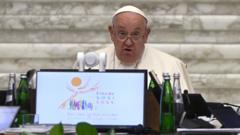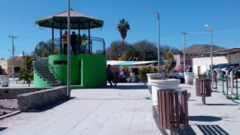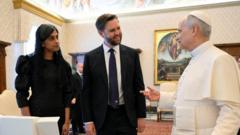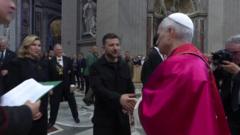The Vatican's recent summit has resulted in a push for enhanced leadership roles for women within the Catholic Church but did not extend to ordaining women as priests or deacons.
Vatican Synod Concludes, Advocates for Women's Leadership in Church

Vatican Synod Concludes, Advocates for Women's Leadership in Church
Month-long assembly ends without ordination calls but emphasizes women in leadership roles.
Article Text: A month-long Vatican summit has concluded with a clarion call for elevating women's leadership roles in the Catholic Church. However, contrary to the hopes of many advocates, the gathering did not endorse the ordination of women as priests, a significant agenda item for some progressives at the outset of discussions. This synod marks the culmination of a four-year consultation process designed to solicit perspectives from Catholics around the world.
Pope Francis extended the typically clerical bishops' conference to include a diverse group of lay participants, comprising nearly 60 women among 368 voting delegates. The members deliberated on 151 proposed actions, achieving a two-thirds majority on all. Nonetheless, the proposal to enhance women's roles in the Church garnered the majority of dissenting votes, highlighting the controversial nature of gender dynamics within the predominantly male leadership.
Despite hopes for ordination opportunities for women as deacons, the synod's concluding document expressed that there are no existing barriers preventing women from undertaking leadership roles—though it refrained from explicitly endorsing female deaconship. Currently, the Catholic Church permits only men to serve as deacons, who are limited to officiating select ceremonies but not the Mass.
Advocates for inclusivity also sought a more welcoming stance towards the LGBT community. However, the final document made only a fleeting reference to individuals who feel marginalized due to their "marital status, identity, or sexuality," without directly addressing LGBT concerns. Notably, Reverend James Martin, a recognized Jesuit priest advocating for LGBT rights, remarked that the lack of explicit mention was not unexpected.
While progressives may express disappointment, conservative factions had reservations about the summit from its inception, questioning the appropriateness of involving lay Catholics in church governance. Pope Francis, at 87, champions a perspective that emphasizes grassroots input from parishioners as essential to the Church's future, a stance that has drawn criticism from traditionalist circles.
This synod has been characterized as a massive undertaking, and Pope Francis termed the resultant text a "gift" to the Church's 1.4 billion followers. The overall response remains mixed as the dialogue around reform, gender, and inclusion continues within the Church's complex landscape.
Pope Francis extended the typically clerical bishops' conference to include a diverse group of lay participants, comprising nearly 60 women among 368 voting delegates. The members deliberated on 151 proposed actions, achieving a two-thirds majority on all. Nonetheless, the proposal to enhance women's roles in the Church garnered the majority of dissenting votes, highlighting the controversial nature of gender dynamics within the predominantly male leadership.
Despite hopes for ordination opportunities for women as deacons, the synod's concluding document expressed that there are no existing barriers preventing women from undertaking leadership roles—though it refrained from explicitly endorsing female deaconship. Currently, the Catholic Church permits only men to serve as deacons, who are limited to officiating select ceremonies but not the Mass.
Advocates for inclusivity also sought a more welcoming stance towards the LGBT community. However, the final document made only a fleeting reference to individuals who feel marginalized due to their "marital status, identity, or sexuality," without directly addressing LGBT concerns. Notably, Reverend James Martin, a recognized Jesuit priest advocating for LGBT rights, remarked that the lack of explicit mention was not unexpected.
While progressives may express disappointment, conservative factions had reservations about the summit from its inception, questioning the appropriateness of involving lay Catholics in church governance. Pope Francis, at 87, champions a perspective that emphasizes grassroots input from parishioners as essential to the Church's future, a stance that has drawn criticism from traditionalist circles.
This synod has been characterized as a massive undertaking, and Pope Francis termed the resultant text a "gift" to the Church's 1.4 billion followers. The overall response remains mixed as the dialogue around reform, gender, and inclusion continues within the Church's complex landscape.



















